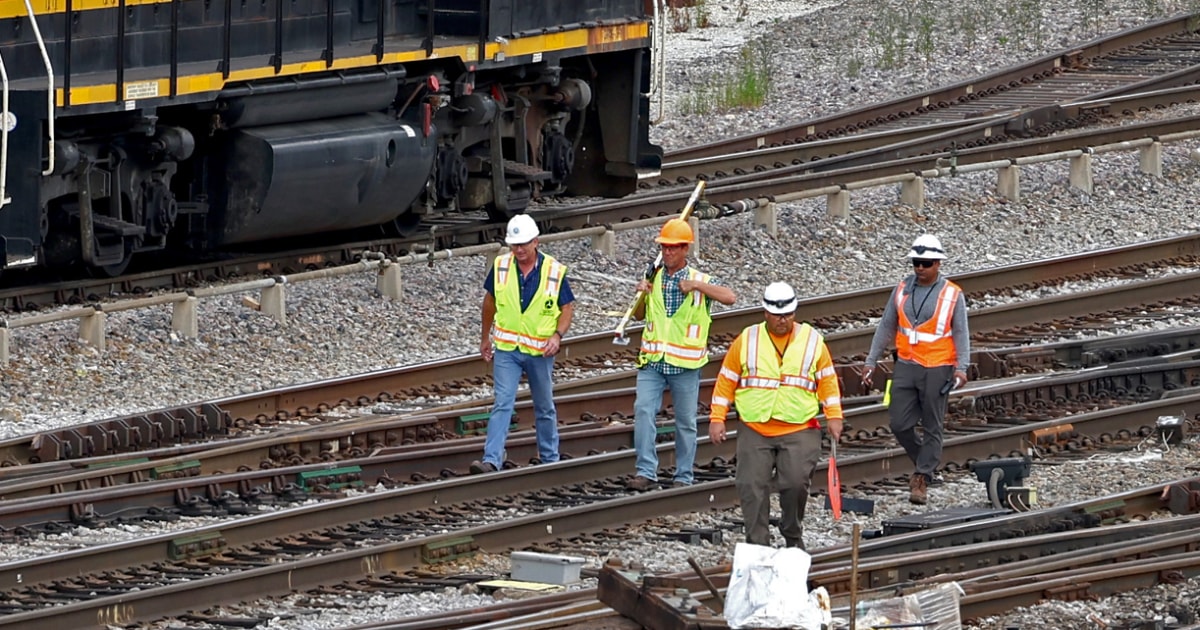But so far, there has been little momentum in Congress to pass any legislation to avert a strike with lawmakers returning from the Thanksgiving recess with an already packed schedule.
There are several steps Congress has the authority to take to prevent a rail strike, something it has done 18 times since the 1960s. It could extend the so-called cooling off period, giving the parties more time to try to reach a voluntary agreement before workers can strike. It could also impose a labor agreement on the workers that is similar to the one already agreed to by labor leaders and carriers or make modifications to that agreement that could be more or less favorable to workers or their employers.
Pelosi said the House would vote this week on the legislation Biden is calling for, which wouldn’t make any changes to the current agreement.
“This week, the House will take up a bill adopting the Tentative Agreement — with no poison pills or changes to the negotiated terms — and send it to the Senate,” she said in a statement following Biden’s.
Republican leader Rep. Kevin McCarthy departed the White House meeting critical of the need to pass legislation, but signaling he thought it would pass.
“I think it will pass but it’s unfortunate this is how we’re running our economy today,” McCarthy said.
But the bigger obstacle may lie with the Senate where Democrats and Republicans will need to come together to get the 60 votes needed to avoid a filibuster.
For Democrats, imposing a contract on workers would seemingly fly in the face of the pro-union positions many have spent their careers advocating for and risk upsetting their key constituency of union members and labor leaders.
But it could also provide an opportunity for Democrats to step in and give additional benefits to the rail workers, like paid sick days, though that would likely make it more difficult to garner Republican support.
Sen. Bernie Sanders blocked legislation in September that would have averted a potential strike at the time before a tentative agreement was reached, arguing that rail workers needed better sick leave.
As for Republicans, the prospect of a strike provides them an opportunity to blast Biden for his handling of the economy and fan the flames of a potential economic disruption that could hurt Democrats in the next election. It could also give them an opening to weaken the contract brokered with labor leaders, making it more favorable to the industry.
Sen. Roger Wicker, R-Miss., the top Republican on the Commerce Committee, sounded an optimistic tone.
“The president says he is going to ask Congress to act, and I would expect Congress to support that request,” he said.
‘Time to dither’
The companies have warned that a shutdown of the railways would quickly result in cities running out of clean drinking water, shortages of fuel, and farmers unable to get feed for their livestock. It would also cause manufacturing across a range of sectors to grind to a halt and result in backlogs at the ports with trains unable to transport cargo off ships.
“If you look at the national harm that would come around even by the build up of a strike it is simply untenable and we are well past time for having Congress step in and resolve this,” said John Drake, vice president of transportation, infrastructure and supply chain policy for the U.S. Chamber of Commerce. “They aren’t going to have a choice, this is not something where we have time to dither around with it. Congressional leadership is going to have to step in and take action and we are going to need bipartisan support and frankly, we have run out of time for political games. We need a solution now.”
More than 400 industry groups signed on to a letter to congressional leadership Monday imploring them to act and warning a strike would result in “certain economic destruction.” The White House estimates as many as 765,000 Americans could be put out of work in the first two weeks of a strike.
“The only thing standing in the way of ensuring that the American economy doesn’t take a major hit as a consequence of a catastrophic rail strike is the United States Congress,” said Mike Sommers, head of the American Petroleum Institute, in a call with reporters. “We need to make sure that the United States Congress acts on this as quickly as possible to take away any threat of that economic calamity from occurring.”
Julie Tsirkin, Eli M. Rosenberg and Frank Thorp V contributed.
Share your story or advertise with us: Whatsapp: +2347068606071 Email: info@newspotng.com
















